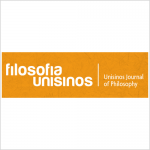The exercise of epoché and the variations of the transcendent in the phenomenology of Edmund Husserl
Vol 13, No 1 (2012) • Filosofia Unisinos - Unisinos Journal of Philosophy
Autor: Carlos Diógenes Côrtes Tourinho
Resumo:
The epoché is initially on what is transcendent in the sense of what is outside intellectual experience. Attention is focused on what is revealed in the cogitatio. But Husserl goes beyond of the so-called “certainty of cogitatio” by generalizing the suspension of judgment. The transcendent is to be understood as the domain where we cannot eliminate the possibility of doubt as to the position of existence of things and the empirical self. Despite immanence, the intended object does not lose, in its reduced version, its otherness. We then see a third use of the term “transcendent”. This reduction reveals a new dimension of the relationship between consciousness and the world, preventing authentic immanent objectivity from disappearing.
ISSN: ISSN: 1984-8234
Texto Completo: http://revistas.unisinos.br/index.php/filosofia/article/view/fsu.2012.131.03
Palavras-Chave: phenomenology,Edmund Husserl,consciousness,wo

Filosofia Unisinos - Unisinos Journal of Philosophy
The journal Filosofia Unisinos - Unisinos Journal of Philosophy is published once every four months by Universidade do Vale do Rio dos Sinos.
Articles must be original, unpublished, and not under consideration for publication anywhere else and can be written in Portuguese, English or Spanish
Filosofia Unisinos - Unisinos Journal of Philosophy prints articles, translations and critical book reviews. It also reprints papers that are considered fundamental to the area when authorized written permission is given by the original publisher.
